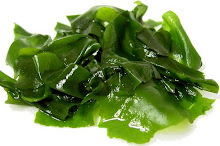
Arsenic Warning Poster | Source: archives of the USDA APHIS Pest Survey Detection and Exclusion Laboratory
Early in my introduction to sea veggies it was suggested that I should do some research about the arsenic levels in SVs. Sea vegetables are like a sponge — they have the ability to absorb minerals from the water and to hold onto them in their cell walls. This is the reason why sea vegetables contain more good minerals than most land vegetables. On the other hand, this means that they can also absorb contaminants in the water such as arsenic, lead and cadmium. For this reason, sea vegetables are often used as a monitor for how polluted waters have become. (More on the topic of SVs as a monitor for water pollution in a later post)
Inorganic arsenic is found in pesticides, paint, and other manufactured chemical compounds. Its is highly toxic and carcinogenic. Organic arsenic however, is not connected to health problems in humans and is found in most sea vegetables & seafood.
Among all sea vegetables hijiki in particular absorbs the highest levels of inorganic arsenic. In 2001 the Canadian Food Inspection Agency (CFIA) issued a fact sheet entitled, Inorganic Arsenic and Hijiki Seaweed Consumption. It was their recommendation in this fact sheet that consumers not eat hijiki at all because of its high levels of inorganic arsenic.
In this really interesting and thorough response, Eden Organics (a large SV supplier) presents these compelling arguments against the CFIA findings:
- The Japanese Ministry of Health and Welfare posted a statement July 30, 2004 on the Internet stating that, "There are no records of cases of arsenic poisoning as a result of the arsenic content of sea vegetables."
- The CFIA and the FSA failed to inform consumers that all of the negative research regarding inorganic arsenic was performed on various species of laboratory animals often injecting or feeding them very high amounts of pure inorganic arsenic chemically extracted from various sources. There are no cases of arsenic poisoning in either laboratory animals or humans who where fed hijiki, or any other sea vegetable in whole form, which contain many valuable nutrients and compounds such as organic arsenic, referred to as arsenosugars.
- Several studies have demonstrated that organic arsenic compounds are changed to inorganic compounds during arsenic testing due to the highly acidic nature of the testing mediums used, specifically hydrochloric acid, sodium borohydride, methanol, nitric acid, sodium hydroxide and other chemicals, as well as micro waving. It is a common laboratory practice to soak sea vegetables in these acid compounds before and during testing.[ Organic arsenic is not reported to cause negative health]
- Rather than being a source of heavy metals in the diet, sea vegetables have been shown to cleanse the body of heavy metals and other toxins. Alginate or alginic acid is a polysaccharide that is abundant in sea vegetables, especially brown sea vegetables including hijiki, wakame, kombu and arame.
As a distributor of several varieties of sea vegetables, including hijiki (hiziki) we feel confident, after reviewing all the documented scientific evidence, that EDEN Hiziki does not pose a health risk when eaten in moderation as part of a healthy balanced diet and when properly cleaned and soaked, as has been done in Japan for centuries. We would like to encourage our consumers to follow our package directions: "wash, soak for 15 minutes in warm water, drain, rinse well and discard the soaking water."I personally trust the quality of their SVs and so I am comfortable eating hijiki once in awhile. I wouldn't neccessary make them a weekly staple though. My TCM (see my post about the radio call in show) also thought it was fine in moderation unless the individual had arsenic sensitivities. For everyone else, I would urge that people make their own decisions about eating hijiki or not. Maine Sea Coast Vegetables makes this statement that sums the situation up:
Because sea vegetables are as low on the scientific research priority list as they are on the food chain, we have to infer in part from studies of other food groups, as well as use our native intelligence and intuition.
More on the topic here.


No comments:
Post a Comment